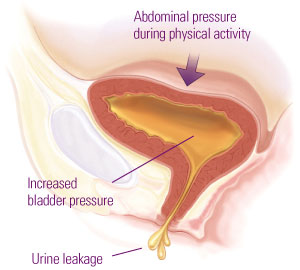There are so many ads nowadays that target men and women who have urinary incontinence. It’s definitely a common issue, but what really starts to aggravate me is when it is normalized. To be clear, it is never normal to leak urine. At any age.
Another common myth we hear is that incontinence only happens to people who have had kids. Well, incontinence can happen to any lucky gal, guy, or non-binary person.
Take my sarcasm with a grain a salt as I know it is definitely not “lucky” to have this inconvenient issue.
Urinary incontinence usually encompasses the unwanted loss of urine, however there are two types major of urinary incontinence:
1. Stress Urinary Incontinence (SUI): loss of urine that occurs with increased intra-abdominal pressure, i.e. coughing, sneezing, laughing, etc.

2. Urinary Urge Incontinence (UUI): a feeling of unexpected and sudden urgency to urinate resulting in an inability to hold back urine that usually results in leakage if you haven’t made it to the toilet.

It is true that many postpartum women will struggle with incontinence symptoms due to the trauma that occurred during labor and delivery or your body’s way of readjusting to your new normal/change in position of your organs. The incontinence symptoms can be short-lived postpartum, or can linger around a little longer than anyone would like it to.
For those who haven’t had a baby, incontinence issues can still arise for a variety of reasons. If you are accustomed to excessive straining during bowel movements or with heavy-loaded lifting (i.e. weight lifting), you could be repetitively weakening your pelvic floor muscles & fascial support. This can inhibit your ability to properly manage increased intra-abdominal pressure, which results in leakage. Age-related changes to the tissue can also be the culprit to urinary incontinence, where hormones or absence of hormones, can weaken the elasticity of your pelvic floor tissues and cause leakage. This type of incontinence is usually associated with weakened pelvic floor musculature.
A surgical trauma to the lower abdomen, digestive tract, excision of an organ, stressful events or generally increased stress in your life can all affect tension within your pelvic floor musculature.
An important point to make is that urinary incontinence occurs in people who can have weakened muscles OR overactive and tight muscles.
If you fall into the category of someone who has had trauma or a surgical procedure, you will typically present with muscles that are overactive and tight. This is your body’s response to the trauma – your muscles want to guard this area and avoid any pain.
A quick physiology lesson:
The pelvic floor muscles and bladder work in opposition to one another. Meaning, when the bladder contracts and tries to tell the brain that it’s full and needs to to let out urine, it’s waiting for your pelvic floor muscles to relax so urine can flow through the pelvic “bowl,” which is where your pelvic muscles lie. Let’s say you aren’t in a place to actually go to the bathroom. Instead, your pelvic floor muscles will engage, turning off the contractions from your bladder and allowing you time to get to the toilet.
This system of bladder and pelvic floor contractions can be interrupted if you (a) don’t have the pelvic floor muscle strength to stop the bladder from contracting; or (b) your pelvic floor muscles are already so tight and overactive that you are unable to actively engage these muscles to the degree that is needed in order to send the appropriate signal. Just like your muscles can get fatigued after a tough workout or physical activity, your pelvic floor muscles could be working overtime and become fatigued as well.
In either situation, a bladder retraining program will be helpful, along with a pelvic floor assessment done by a physical therapist, who will be able to assess the state of your muscles. After the assessment, we will be able to figure out how to stop the leakage and help you return to a drier state of life.

